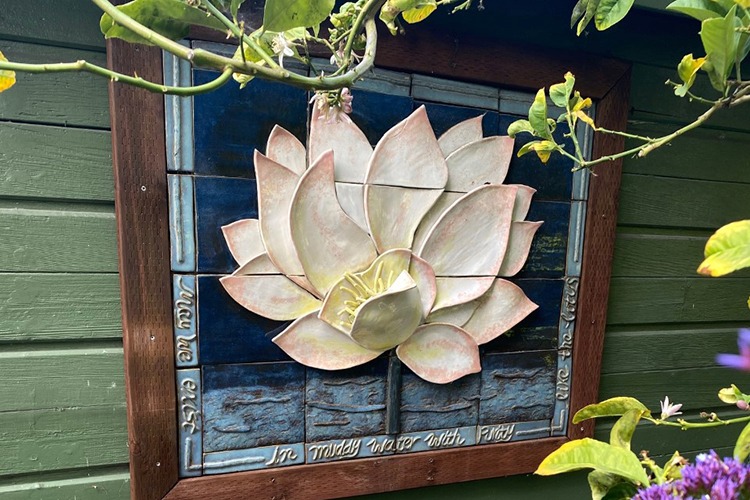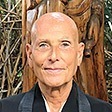
The Four Bodhisattva Vows
January 1, 2023
 by Jonathan Kaigen Levy
by Jonathan Kaigen Levy
“A bodhisattva is a person who lives by vow instead of by karma. As we grow up, we learn a system of preferences and values from the culture around us, which we use to evaluate the world and choose action. This is living by karma. In contrast, a bodhisattva lives by vow. Vow is like a magnet or compass that shows us the direction toward the Buddha.”
–Living by Vow, Shohaku Okumura
Numberless beings, I vow to serve them.
Inexhaustible delusions, I vow to end them.
Boundless dharmas, I vow to practice them.
Unsurpassable Buddha Way, I vow to embody it.
I have chanted these Four Bodhisattva Vows countless times throughout years of Zen practice. This year, I decided to offer a series of four classes in which participants would chant the vows both in English, and in Japanese. We investigated each vow through dharma teachings and discussions, the aim being to uncover the ways our individual feelings and beliefs form concepts about how we would like the vows to operate in our personal lives. And, since these ideas and personal stories may often remain hidden from ourselves, they still manage to color our vows. Our focus was how these self-created concepts actually work to separate us from the Oneness of the bodhisattva path.
What follows is a description of what we encountered in our classes:
The Four Great Bodhisattva Vows probably originated in China in the sixth century. They may have derived from what is believed to be the oldest Buddhist manuscript in existence, The Astasāhasrikā Prajñāpāramitā Sūtra, or Perfection of Wisdom in 8,000 lines. Concerned with the conduct of a bodhisattva, the sutra stresses the realization and attainment of the Perfection of Wisdom, the realization of “thus-ness”or “suchness,” and the abandonment of self-serving views and attachments to any phenomenon – the realization of emptiness.
1) Shu jō mu hen sei gan do, translated from Japanese – Numberless beings, I vow to save/serve them.
Immediately a question is thrust before us: Just how will we go about saving all these numberless beings? The class thought it sounded like a foolishly impossible task. They asked, “If we already know the futility of it, then why on earth would we do it?”
Buddha’s answer: “And though I thus liberate countless beings, not a single being is liberated. And why not? Subhuti, a bodhisattva who creates the perception of a self, or a soul, cannot be called a bodhisattva.’’ –The Diamond Sutra translated by Red Pine
“Not a single being is liberated? If that’s true, then what is the first vow really about?” they asked.
Wow. The quote really stirred things up for the class. That’s good.
Chan Master Dajian Hui-neng explained, “Good friends, please recite after me: The beings in my own mind are infinite; I vow to liberate them. The beings in the mind are delusion, deception, immorality, jealousy, malice; these states are all beings. Liberate yourself through your own essential nature; this is called ‘true liberation.’ ”
This shook the class up even further. “You mean to say that it’s all in my mind, all those numberless beings? What about my family, my boss, the insect, the tree? All in my mind? It sounds so self centered,” they replied.
Master Hui-neng answered: “You are saving them all in your own mind. No matter how numberless, it isn’t Hui-neng, or you who does the saving. Every being you can think of saves themselves with their own enlightened nature. Those who are saved like this, are truly liberated. This is the power of vowing.”
2) Bon nō mu jin sei gan dan – Inexhaustible delusions, I vow to end them.
These are the passions that disturb and distress us. Again, the second vow is all about our own minds; and it expresses our aspiration to “cut off the mind road,” to stop the incessant chatter of “me, my, mine.” In the silence that follows, we turn naturally to the well-being of others. But, what if our deluded minds aren’t a barrier to enlightenment?
“The ultimate paradox of Zen liberation is said to lie in the fact that one attains enlightenment only in and through delusion itself, never apart from it. Enlightenment consists not so much in replacing, as in dealing with or negotiating delusion.”
–Dogen on Meditation and Thinking: A Reflection on His View of Zen, Hee-Jin Kim
What if our delusions are the very path to enlightenment?
Courageously, the bodhisattva studies his/her delusions, and how they present in their body and mind. Awakening is about not being obsessed by them, or acting them out. Then, we can shed light on the shadows of our conditioned self, and we can act in the light of helpfulness to all beings. Those who take the bodhisattva vow make one simple commitment: Put others first, holding nothing back for themselves, even one’s own enlightenment, all for the sake of others.
Sometimes the blankets come off my wife at night. There is no thought in my mind that she is cold, yet, I just reach over and pull the blankets back over her. It’s almost an impersonal affair in that this is what needs to happen in the moment. It’s just an instinct to take care of her. But, if I am carrying into the situation something that is extra: this idea that I’m the one who’s going to be helpful, I’ve already created separation.
3) Hō mon mu ryō sei gan gaku – Boundless Dharma gates, I vow to enter them.
These teaching “gates” are infinite opportunities for us, to play within the diversity of dharma openings that occur every moment in our everyday lives. When we can be open to them they provide us countless opportunities for endless realization of the bodhisattva way. The sounds of the rain tapping on the roof, smiling at the sight of a golden flower, the touch of a loving partner, the whole universe itself, all become chances for liberation; but only if we are ready to completely lose ourselves, to disappear. We enter these gateways to awaken to our delusions, this is the process of fully knowing ourselves. This is devotion to the creative joy and art of the bodhisattva, engaged in endless play, expressed in the practice of vow.
4) Butsu do mu jo sei gan jo – Unsurpassable Buddha Way, I vow to embody/be it.
Finally, we vow to walk the Eightfold Path of the Buddha as vigorously and as nobly as he did. This is the Way that begins with right views: clear insight into the insubstantial nature of the self and all things, and extending to the uniqueness of each individual being.
So, the Buddha’s Way is unsurpassable, and yet, we foolishly keep vowing to become it, even when we get it wrong. And yet, this path contains everything we need, nothing is lacking. We practice it with our entire being, and that is why we can say “we vow to be it.” And we can honestly and wholeheartedly say this because we are already Buddha, right from the start. Universal Buddhahood, Interdependence, and Radical Nonduality; this is our faith.
Dogen Zenji said, “There is no need to change our existing body and mind, for the direct realization of the Way is neither to be bound by old viewpoints, nor to create new ones. The Buddha Way is to not look aside. It is to be with whatever we encounter right here now.”
At first, we may see the path as merely placating our personal struggles and our pains, but as we proceed a deeper understanding grows of the depth, the mystery, and the wonder of the Way. We learn that it is not about “me,” but about a magnificent “us” that encompasses the whole world.
In this very moment we have the opportunity to fulfill our Bodhisattva vows. After making this Great Vow, you, the Bodhisattva, belongs to the entire universe. The vow itself possesses cosmic significance; the vow itself is a cosmic force.
Are you ready to taste the flavor of truth, to take the vow to enter every experience, every dharma gate? I can’t tell you what you’ll encounter, but I suspect it won’t contain any of your old ideas, things, or people. You will discover life itself, vividly appearing to you. And you will know for yourself, like the Buddha, that you, and I, the great earth, the stars, the moon, and all beings, are naturally and simultaneously awakened.
Master Dogen said it best: “This is the mindset that Buddha after Buddha has transmitted. We together with all beings, are now receptive to hearing the true Dharma, accepting the true Dharma, and attaining the Way. Surrender, surrender to the Vow.”
Sensei Kaigen is a ZCLA priest who recently moved to Prescott, AZ.
